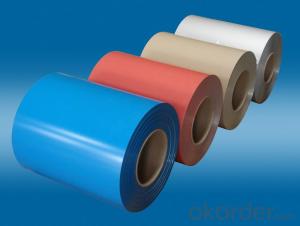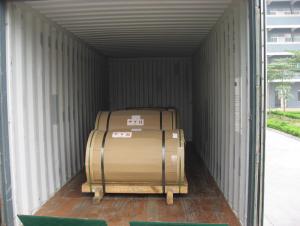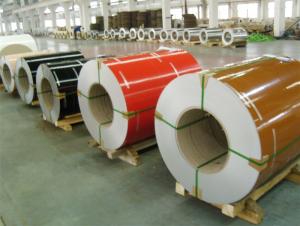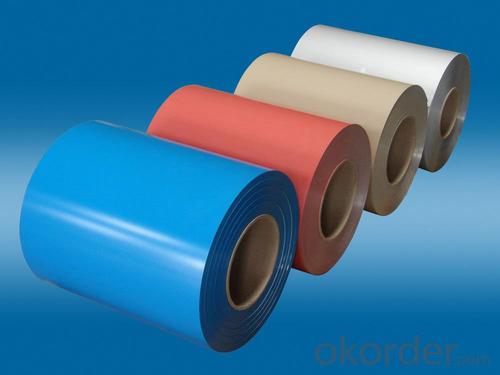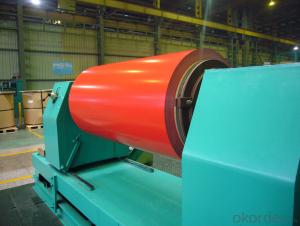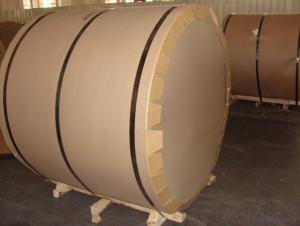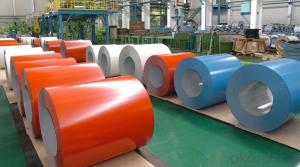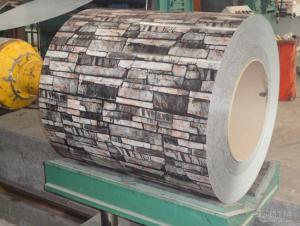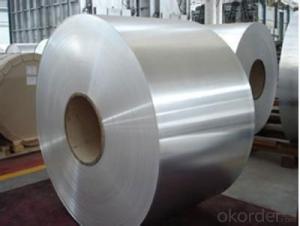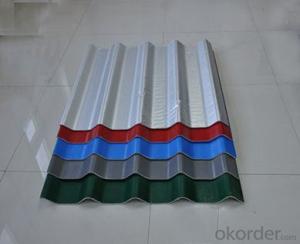Aluminum Coil for Channel Letters - Coated Aluminum Coils AA1xxx
- Loading Port:
- China Main Port
- Payment Terms:
- TT or LC
- Min Order Qty:
- 5 m.t.
- Supply Capability:
- 100000 m.t./month
OKorder Service Pledge
OKorder Financial Service
You Might Also Like
1.Structure of Coated Aluminum Coils AA1xxx Description
Coated Aluminum Coils AA1xxx are of a wide range of colors, which give wonderful appearance no matter in residential and commercial constructions or great exhibition centers.
Coated Aluminum Coils AA1xxx have been widely used in the fields of construction and decoration, electronic applications, lighting decoration, air-condition air pipes, sandwich panels and drainages etc.
2.Main Features of Coated Aluminum Coils AA1xxx
• Superior quality of raw material
• Reasonable and stable chemical composition
• Accurate tolerance
• Goode mechanical property
3.Coated Aluminum Coils AA1xxx Images
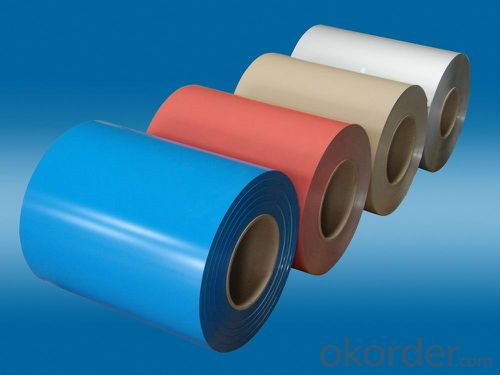
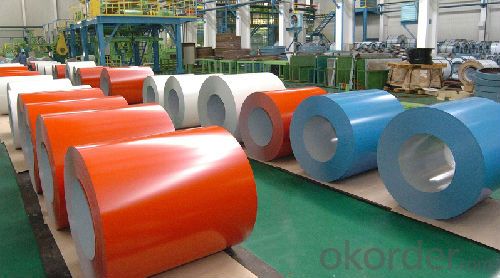
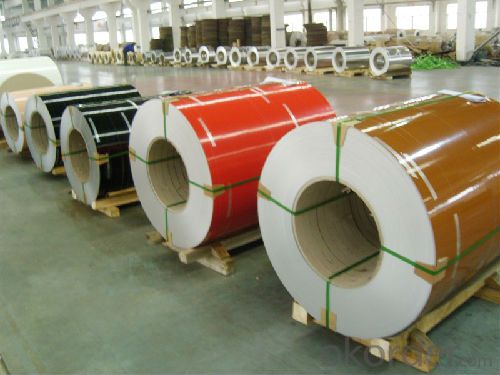
4.Coated Aluminum Coils AA1xxx Specification
Alloy | AA1xxx (AA1050, AA1100 etc.) |
Temper | H14, H16, H18, O/F |
Thickness | 0.2mm -- 100mm |
Width | 30mm -- 1700mm |
Standard | GB/T 3880-2006,EN,JIS |
5. FAQ of Coated Aluminum Coils AA1xxx
A. Where is your mill located?
In Zhejiang Province, China.
B. What is the terms of payment.
L/C ( at sight, 30/60/90 days from B/L date), TT payment.
- Q: Can aluminum coils be used in the production of aluminum composite ceilings?
- Yes, aluminum coils can be used in the production of aluminum composite ceilings. Aluminum coils are often used as the base material for manufacturing aluminum composite panels, which are then used to create ceilings. These coils are typically made of high-quality aluminum alloy and have undergone various processes to ensure their strength, durability, and aesthetic appearance. The aluminum coils are coated with a protective layer, such as PVDF or polyester, to enhance their resistance to weathering, UV rays, and corrosion. This coating also allows for a wide range of color options, providing flexibility in design choices for aluminum composite ceilings. Overall, aluminum coils are an essential component in the production of aluminum composite ceilings, offering a lightweight, fire-resistant, and long-lasting solution for various architectural and interior design applications.
- Q: Can aluminum coils be used for pharmaceutical packaging?
- Yes, aluminum coils can be used for pharmaceutical packaging. Aluminum is a popular choice for pharmaceutical packaging due to its various beneficial properties. It is lightweight, corrosion-resistant, and has excellent barrier properties, making it ideal for protecting pharmaceutical products from external factors such as moisture, oxygen, and light. Aluminum coils can be easily formed into different shapes and sizes, providing versatility for packaging needs. Additionally, aluminum is non-toxic and non-reactive, ensuring the safety and integrity of pharmaceutical products.
- Q: Can aluminum coils be used in food processing or packaging applications?
- Yes, aluminum coils can be used in food processing or packaging applications. Aluminum is a safe and reliable material that is widely used in the food industry due to its corrosion resistance, heat conductivity, and ability to maintain product quality. It is commonly used for making food containers, cans, foil, and other packaging materials.
- Q: Is it safe and practical to use aluminum coils in cooking processes?
- <p>Aluminum coils can be used for cooking, but with certain precautions. They are commonly used in commercial kitchens for their heat conductivity and durability. However, for home cooking, it's important to avoid acidic or alkaline foods, as aluminum can react with them. Additionally, prolonged exposure to heat can cause aluminum to leach into food, which some studies suggest may have health implications. It's advisable to use aluminum cookware with a protective coating or opt for alternative materials like stainless steel or cast iron for health-conscious cooking.</p>
- Q: How are aluminum coils protected against mechanical damage?
- To safeguard aluminum coils from mechanical harm, multiple methods are employed. One of the primary techniques involves the application of a protective coating or finish to the coil's surface. This coating acts as a shield, preventing any potential sources of mechanical damage, such as impact or abrasion, from affecting the coil. The coating itself can either be a standard paint or a specialized aluminum coating, offering enhanced durability and resistance to scratching or denting. Apart from the protective coating, aluminum coils may also undergo reinforcement with an additional layer of laminate or film. This supplementary layer provides an extra level of defense against mechanical damage, effectively warding off dents or scratches. The application of the laminate or film can occur during the manufacturing process or as a separate step following coil production. Furthermore, to minimize the risk of mechanical damage during transportation or storage, aluminum coils can be wrapped or packaged in protective materials like plastic or foam. These wrappings serve to cushion the coil and create a barrier against potential impacts or heavy objects that could cause damage. In conclusion, a combination of protective coatings, laminates, and packaging materials ensures the adequate protection of aluminum coils from mechanical harm. These measures are instrumental in preserving the integrity and quality of the coils, enabling them to effectively fulfill diverse applications.
- Q: How are aluminum coils used in the manufacturing of household appliances?
- Aluminum coils are used in the manufacturing of household appliances as they provide excellent conductivity, durability, and corrosion resistance. These coils are commonly used in appliances such as refrigerators, air conditioners, and heating systems. They help in transferring heat efficiently, improving energy efficiency, and ensuring the longevity of the appliance. Additionally, aluminum coils are lightweight, making them easier to handle during the manufacturing process.
- Q: What is the typical density of aluminum coils?
- The typical density of aluminum coils is around 2.7 grams per cubic centimeter (g/cm³).
- Q: Are there any limitations on the welding or soldering of aluminum coils?
- Welding or soldering aluminum coils comes with limitations. Aluminum is a reactive metal with a low melting point, making it more challenging to weld or solder compared to other metals. One limitation is the formation of oxide layers on the aluminum surface, which prevents strong bonding during the welding or soldering process. These oxide layers must be removed beforehand, either through chemical cleaning agents or mechanical methods like abrasive cleaning. Another limitation is aluminum's high thermal conductivity, which leads to rapid heat dissipation. This makes it difficult to reach and maintain the necessary temperature for welding or soldering. Overcoming this limitation may require specialized techniques and equipment, such as high-frequency welding or preheating the aluminum. Moreover, aluminum is prone to deformation or warping under high temperatures. This can cause distortion or changes in the coil's shape during welding or soldering. To minimize this, proper clamping or fixturing techniques are often necessary. Furthermore, using filler materials in welding or soldering aluminum coils can be challenging. Aluminum has a relatively high thermal expansion coefficient, meaning it expands and contracts significantly with temperature changes. If the filler material doesn't have a similar expansion coefficient, it can lead to cracks or weak joints. To address this, specialized filler materials like aluminum-silicon alloys are commonly used. In conclusion, while it is possible to weld or solder aluminum coils, it requires specialized knowledge, techniques, and equipment to overcome the limitations posed by the metal's reactivity, heat dissipation, deformation, and filler material selection.
- Q: How are aluminum coils used in the production of marine vessels?
- Aluminum coils are extensively used in the production of marine vessels due to their unique properties and advantages. Firstly, aluminum is a lightweight material compared to other metals commonly used in shipbuilding such as steel. This characteristic makes it ideal for constructing marine vessels as it reduces the overall weight of the ship, allowing it to float more easily in water. The use of aluminum coils in the construction process ensures that the vessel remains buoyant without compromising its structural integrity. Secondly, aluminum is highly corrosion-resistant, especially when exposed to saltwater environments. Marine vessels are constantly exposed to water, which can be corrosive and damaging to metal components. By using aluminum coils, shipbuilders can minimize the risk of corrosion and increase the longevity of the vessel. Moreover, aluminum coils offer excellent thermal conductivity. This property is crucial in marine vessels as it helps dissipate heat generated by engines, machinery, and equipment, ensuring that the ship operates efficiently and safely. Additionally, aluminum coils can be easily formed, shaped, and welded, making them highly malleable and adaptable for various shipbuilding requirements. This flexibility allows shipbuilders to create complex and streamlined designs, optimizing the vessel's performance and fuel efficiency. Furthermore, aluminum coils are environmentally friendly as they are 100% recyclable, reducing the carbon footprint associated with marine vessel production. This aspect aligns with the growing demand for sustainable and eco-friendly shipbuilding practices. In conclusion, aluminum coils play a vital role in the production of marine vessels. Their lightweight nature, corrosion resistance, thermal conductivity, malleability, and recyclability make them an ideal choice for shipbuilders. By utilizing aluminum coils, marine vessels can be constructed to be more efficient, durable, and environmentally friendly.
- Q: Can aluminum coils be used for solar panel applications?
- Yes, aluminum coils can be used for solar panel applications. They are often utilized as the base material for solar panels due to their lightweight, corrosion-resistant, and durable properties. Additionally, aluminum coils offer good thermal conductivity, enabling efficient heat dissipation in solar panels.
Send your message to us
Aluminum Coil for Channel Letters - Coated Aluminum Coils AA1xxx
- Loading Port:
- China Main Port
- Payment Terms:
- TT or LC
- Min Order Qty:
- 5 m.t.
- Supply Capability:
- 100000 m.t./month
OKorder Service Pledge
OKorder Financial Service
Similar products
Hot products
Hot Searches
Related keywords
